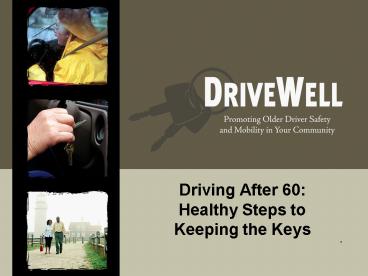Driving After 60: Healthy Steps to Keeping the Keys - PowerPoint PPT Presentation
1 / 25
Title:
Driving After 60: Healthy Steps to Keeping the Keys
Description:
Vision provides 90 percent of our sensory cues for driving ... Sunglasses in easy reach. Money ready for tolls. Read your map before you start your trip ... – PowerPoint PPT presentation
Number of Views:54
Avg rating:3.0/5.0
Title: Driving After 60: Healthy Steps to Keeping the Keys
1
Driving After 60 Healthy Steps to Keeping the
Keys
- .
2
Why Do We Drive?
- Independence
- Freedom
- Convenience
- Connection and
- contribution to the
- community, friends, family
- Respect
- Pride of owning a vehicle
3
Changes in Roads
- How are todays cars different ?
4
Changes in the Roads
- What about the roads and driving today?
- How has driving changed?
5
Changes in Us
- What changes have you noticed?
6
What Changes Can Affect Safe Driving for Older
Adults?
- Vision
- Strength, flexibility
and reflexes - Health conditions like arthritis
- Memory
7
Vision Changes that Affect Driving
- Vision provides 90 percent of our sensory cues
for driving - Good vision is more than how far or close we can
see
8
Vision
9
Adaptation to Changes
- Adjust mirrors properly before driving
- Check rearview mirror every 10 to 20 seconds
- Turn your head and look before changing lanes or
merging with traffic
10
Strength, Flexibility and Reflexes
- Aging may bring diminished
- Muscle strength to legs, arms and handgripall
important for vehicle control - Flexibility to look over the shoulder for
checking traffic - Reaction time to respond to traffic or road
hazards
11
Physical Activity
- Develop your weekly routine that includes
- Strengthening
- Stretching
- Endurance
- Balance development
12
Adaptive Equipment
- Seat Belt Adapters
- Pedal extenders
- Left foot accelerators
- Extra loud turn-signal clickers
- Turn signals moved to the other side of the
steering column - Handy bar
- Leg lifter
- Consult a professional first before time and
money on adaptive devices
13
Medications
- Older adults may
- Be more susceptible to adverse
- or strong reactions
- Because they may take more medications (both
prescribed by a doctor and over-the-counter)
which increases the likelihood for interaction - Because the body may not as effectively use
medications and reacts more strongly to even
lower doses
14
Medication Tips
- Before getting behind the wheel
- Ask your doctor or pharmacist about possible
reactions and side effects - Be aware of your reaction to medications,
vitamins and supplements - Adjust your driving schedule to accommodate the
reaction
15
Memory and Attention
- Driving a car requires
- Making decisions
- quickly which
- requires mental alertness
- Switching attention quickly to many situations
happening on the road - Dividing attention to perform many tasks such as
steering, shifting gears checking mirrors and
looking ahead
16
Staying Mentally Fit
17
Staying Focused
- Eliminate distractions by organizing your trip
- Sunglasses in easy reach
- Money ready for tolls
- Read your map before you start your trip
- Eliminate distraction by controlling your
environment - Turn the radio/music down or off
- Ask passengers to keep conversations down
- Watch your temper (no matter how stupid the other
driver) - Drive on familiar roads
18
Sleep and Rest
- Improve concentration on the road by getting
enough sleep and rest - Practice habits of sleep health
- Avoid naps
- Develop a regular time to go to bed
- Do some physical activity each day
- Eat a light meal in the evening
- Avoid drinking tea, coffee, or cocoa six hours
before bedtime
19
Sleep and Rest
20
Alcohol Use
- The Story
21
Alcohol Misuse
- For older adults, alcohol is processed more
slowly than in younger adults and stays in the
body longer - Use of any amount of alcohol can intensify
actions of many medications - Possible result drowsiness, disorientation
22
Tune-Ups for the Body
23
The Conversation about Driving
- When
- Talk about driving
- before a problem develops
- Why
- The discussion is about your connection to the
community and your control over your future - Driving discussions affect othersfamilies, loved
ones and friends and those in the community that
rely on you
24
Where to Go in Your Community
- Handouts from local service providers
25
.































